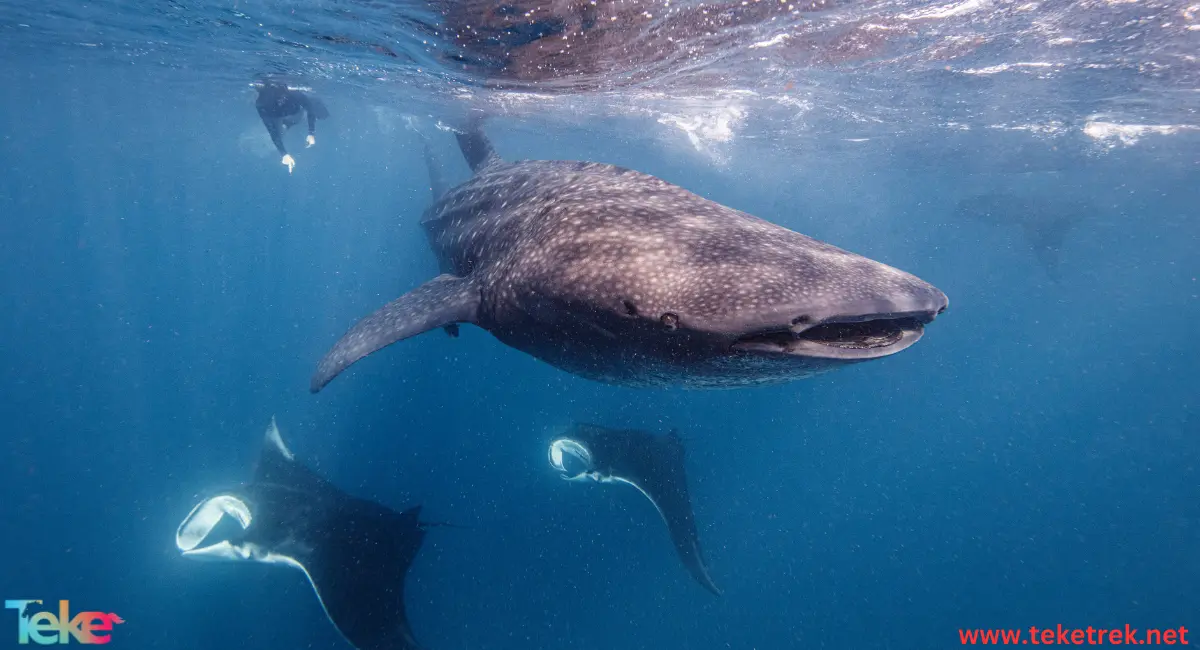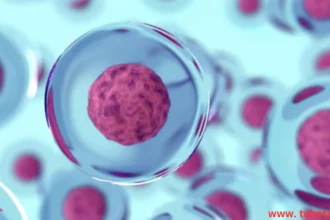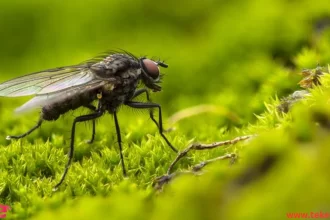The sperm whale is considered one of the largest marine mammals in the world, and it is considered one of the wonderful marine creatures that fascinates many people.
The sperm whale is distinguished by its enormous size and unique shape, which makes it the focus of attention of researchers and marine environment enthusiasts alike.
Schools of sperm whales live in various oceans around the world and have complex social systems that include communication through sounds and complex behaviors. These aquatic mammals are among the most intelligent creatures in the oceans, and use their skills to survive and hunt for food.
Let’s explore more about these fascinating creatures from teke trek.

About the sperm whale
The sperm whale (Physeter macrocephalus) is one of the most famous whale species in the world, and the largest toothed whale. It is the only surviving member of the genus of ambergris (Physeter), and one of the three species belonging to the family of sperm whales. Its name is due to the presence of a waxy liquid in its huge heads known as “ambergris.”
Humans used to extract amber to make perfumes, soaps, and other types of oils and powders. The sperm whale is also known as the huge sperm whale, the great sperm whale, or just the sperm whale.
Global rankings
Kingdom: Animalia
Phylum: Chordata
Class: Mammals (Mammalia)
Order: Cetacea (Cetacea)
Family: Toothed whales (Physeteridae)
Genus: Sperm whales (Physeter)
Type: Macrocephalus whales
Sperm whale habitat
The sperm whale lives in all oceans and seas in the world, including the Mediterranean Sea. It mainly prefers areas containing giant squid, in addition to tropical or subtropical waters. Whales’ migration and determination of where they live depend on several factors, such as: sex, age, and food availability.
Sperm whale diet
The giant squid is the favorite food of the sperm whale, which can reach up to 10 meters in length, and therefore has scars resulting from its encounter with the giant squid underwater.
Crustaceans are also controllable animals and are considered a delicacy for the sperm whale. The sperm whale also feeds on smaller squid, fish, octopus, and sharks.
Stages of reproduction in sperm whales
Females become sexually mature at the age of 9 years, reaching a length of approximately 8.8 m. The female sperm whale gives birth to a calf once every 5-7 years. Her pregnancy period lasts from 14 to 16 months, then she gives birth to one newborn, 4 meters long.
Young sperm whales are fed on solid food before the age of one year, but they continue to breastfeed for several years.
The sperm whale benefits for humans and the ecosystem
There are many benefits that the sperm whale provides to the environment and humans alike. The most important of them are:
1. The sperm whale is considered an important part of the marine ecosystem, as it contributes to regulating the balance of marine ecosystems.
2. The sperm whale is an important source for scientific research and environmental studies, which contributes to a better understanding of the marine environment.
3. The amber oil that is extracted from the sperm whale can be used in the medical and chemical industries.
4. The sperm whale contributes to the balance of the marine food chain, by eating fish and other marine animals.
5. The sperm whale can be a source of eco-tourism and sustainable tourism, which contributes to strengthening the economy of the areas in which it lives.
6. The sperm whale can be a source of inspiration and beauty for artists, writers, and photographers.
7. Sperm whale studies may contribute to a better understanding of marine mammal behaviors and the effects of pollution on their health.
8. The sperm whale is considered a source for preserving the diversity of marine life and maintaining the ecological balance in the oceans.
9. The sperm whale may distribute seaweed seeds and algae, contributing to the regeneration of the marine environment.
10. The sperm whale can be a source of inspiration and contemplation of the wonders, marvels and beauty of nature.

FAQs about the sperm whale
The sperm whale is a large marine animal that arouses the curiosity of many, due to its association with amber and the rich history of its use in medicine and perfumery. These marine creatures are considered among the largest creatures on Earth, and are distinguished by their mysterious nature, rich in secrets.
In this paragraph, we will review some frequently asked questions about the sperm whale, and try to clarify some interesting facts and information about this unique sea creature.
Why are sperm whales called sperm?
The sperm whale was named after ambergris, a natural substance extracted from the whale’s stomach. It is believed that this name dates back to the Middle Ages, when it was used in medicine and perfumes and was considered a precious treasure.
When people found pieces of amber in the stomachs of dead whales, they thought it was the result of a digestive process inside the whale’s stomach. Therefore, they began to use these pieces for medicinal and aromatic purposes, and their whales were called “sperm whales.”
Does the sperm whale eat humans
Yes, the sperm whale is the only species with throats large enough to swallow a human.
Is the sperm whale considered a predator?
Yes, the sperm whale is a predatory animal that dives into the deep sea to hunt giant squid and other creatures.
Where does whale ambergris come from?
Whale ambergris is vomit, which comes from the stomach of whales.
What is sperm whale?
Amber is an oily substance that the whale uses to concentrate its voice, and it is also used in lamps, candles, and lubricants.
Are whales threatened with extinction?
Yes, whales face a great threat of extinction due to several factors, including illegal fishing, marine pollution, climate change, in addition to the loss of natural habitats, and collisions with ships.
Some whale species, such as the sperm whale, blue fin whale, and field whale, are at risk of extinction if effective measures are not taken to protect them and preserve their habitats. Many environmental organizations and governments are developing plans to protect sea whales and provide support for conservation efforts.
How long can sperm whales live?
Sperm whale lifespan is 70 years.
In short, it can be said that the sperm whale is considered one of the largest, most beautiful and intelligent sea mammals, and therefore we must work to protect it and preserve its natural environment. Educating people about the importance of protecting this amazing marine creature is an essential step towards preserving the diversity of marine life and preserving the beauty and charm of the marine environment for future generations
Besides the importance of the sperm whale in the marine environment, this creature faces increasing threats from pollution and illegal whaling. Therefore, we must recognize the importance of protecting these wonderful creatures and contributing to preserving the diversity of marine life.





